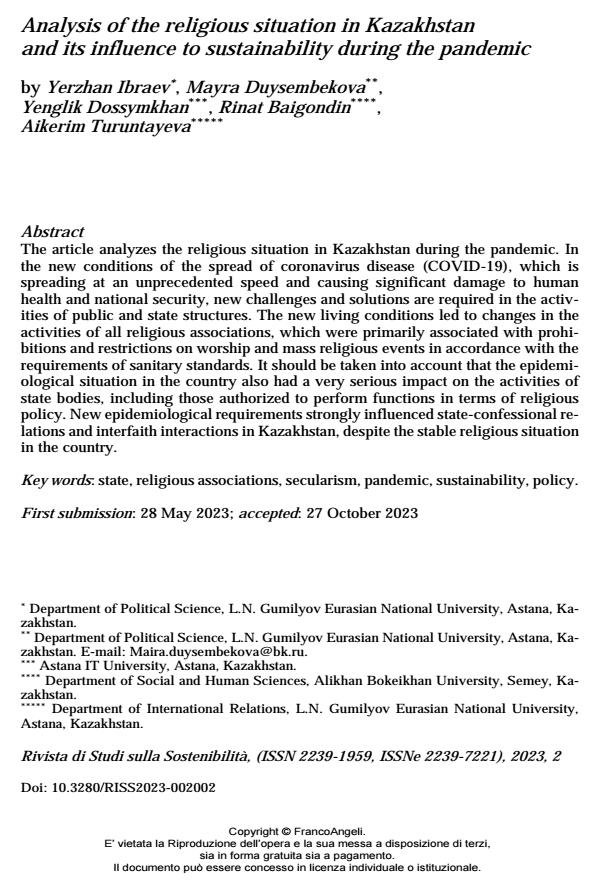Analysis of the religious situation in Kazakhstan and its influence to sustainability during the pandemic
Titolo Rivista RIVISTA DI STUDI SULLA SOSTENIBILITA'
Autori/Curatori Yerzhan Ibraev, Mayra Duysembekova, Yenglik Dossymkhan, Rinat Baigondin, Aikerim Turuntayeva
Anno di pubblicazione 2024 Fascicolo 2023/2
Lingua Inglese Numero pagine 18 P. 11-28 Dimensione file 101 KB
DOI 10.3280/RISS2023-002002
Il DOI è il codice a barre della proprietà intellettuale: per saperne di più
clicca qui
Qui sotto puoi vedere in anteprima la prima pagina di questo articolo.
Se questo articolo ti interessa, lo puoi acquistare (e scaricare in formato pdf) seguendo le facili indicazioni per acquistare il download credit. Acquista Download Credits per scaricare questo Articolo in formato PDF

FrancoAngeli è membro della Publishers International Linking Association, Inc (PILA), associazione indipendente e non profit per facilitare (attraverso i servizi tecnologici implementati da CrossRef.org) l’accesso degli studiosi ai contenuti digitali nelle pubblicazioni professionali e scientifiche.
The article analyzes the religious situation in Kazakhstan during the pandemic. In the new conditions of the spread of coronavirus disease (COVID-19), which is spreading at an unprecedented speed and causing significant damage to human health and national security, new challenges and solutions are required in the activities of public and state structures. The new living conditions led to changes in the activities of all religious associations, which were primarily associated with prohi- bitions and restrictions on worship and mass religious events in accordance with the requirements of sanitary standards. It should be taken into account that the epidemiological situation in the country also had a very serious impact on the activities of state bodies, including those authorized to perform functions in terms of religious policy. New epidemiological requirements strongly influenced state-confessional re- lations and interfaith interactions in Kazakhstan, despite the stable religious situation in the country.
Parole chiave:state, religious associations, secularism, pandemic, sustainability, policy
Yerzhan Ibraev, Mayra Duysembekova, Yenglik Dossymkhan, Rinat Baigondin, Aikerim Turuntayeva, Analysis of the religious situation in Kazakhstan and its influence to sustainability during the pandemic in "RIVISTA DI STUDI SULLA SOSTENIBILITA'" 2/2023, pp 11-28, DOI: 10.3280/RISS2023-002002